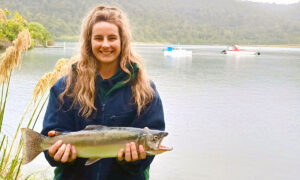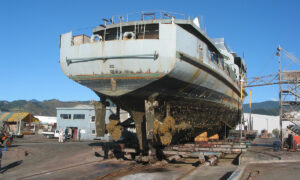Opinion: Recent focus on the threat of cruise ships highlights why marine biosecurity matters
by Dr Bailey Lovett | 02/02/23
When I tell people I’m a marine biosecurity scientist, the response I get is often something along the lines of “marine biosecurity huh, that’s a niche area…” (I understand of course – it’s a bit of a mouthful. The description of what the role involves isn’t necessarily in the name, unless you know what you’re looking for).

Image: Cawthron Institute. Cawthron early career researcher Dr Bailey Lovett at Lake Waikaremoana.
However, if you’ve seen any of the recent news headlines about international cruise ships being stopped from visiting certain parts of New Zealand because they were carrying oysters, snails, and various other hitchhiking critters, you might begin to understand why I don’t think that marine biosecurity is niche at all. In fact, you probably encounter biosecurity issues a lot more than you think.
As humans, we are an integral part of the marine environment. Particularly in New Zealand, where we base so many of our activities and values on the ocean, it’s part of the bedrock of our lives. We fish, we dive, we visit the beach, we go boating, we import and export products by sea, we have a thriving tourism industry where people come from all over the world to experience our unique marine ecosystems and species. Each of those activities carries a level of risk of introducing or spreading harmful or problematic organisms, and therefore inevitably involves biosecurity. This includes management practices applied to stop or control the spread of invasive species and the harm they cause. Therefore, by virtue, we play a fundamental role in the marine biosecurity system. And in that sense, marine biosecurity is not niche.
However, what is niche is the degree of recognition and understanding of what marine biosecurity is. Biosecurity is not as well recognised in the marine environment as it is in the terrestrial (land-based) environment. Most of us know to clean our boots after we walk in the forest so we don’t spread kauri ora (kauri dieback). We know to declare and dispose of any fruits and veggies before we enter New Zealand so we don’t introduce unwanted insects or diseases. We know what possums and stoats and rats and the many varieties of pest weeds that damage our farms and take over our gardens look like.\

Cawthron Institute. Biofouling on a boat hull.
But what is less evident is why we need to keep the bottoms and other areas of our boats clean of critters (so we don’t shift them around to new places), why restrictions are placed on a marine area when an unfamiliar species is found (to stop it from spreading further), or how to recognise marine pests or if the fish we have caught has a disease, and what to do if we do notice something seems off (call the Ministry for Primary Industries (MPI) on 0800 80 99 66, or report it using their online portal).
These things are just as important as our terrestrial biosecurity measures, but there’s a gap in recognition that needs to be filled in order for us all to truly play our role in the protection of our marine environment. Fortunately, I think the key to addressing this is simple – giving greater exposure to and sharing knowledge about marine biosecurity. Because understanding underpins action. When we know better, we do better. The recent coverage of the cruise ship restrictions is a fantastic example – a few snails or oysters might seem trivial, but their potential impacts on our native species and wider marine environment, should they be released and establish here, are not.
So spread the word. Marine biosecurity is not niche. It’s extremely relevant to us all, and if we all make the effort to understand, we can all do our part in protecting what we love. #SpreadTheWordNotInvasiveSpecies